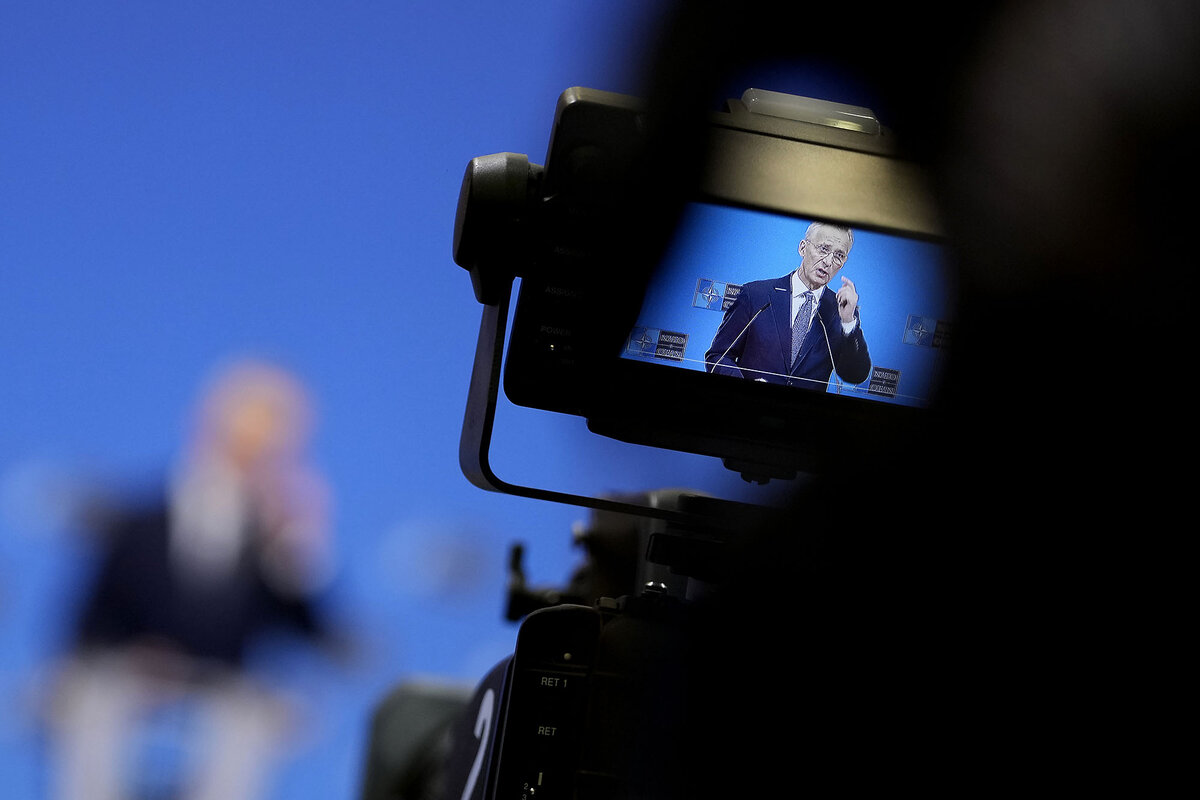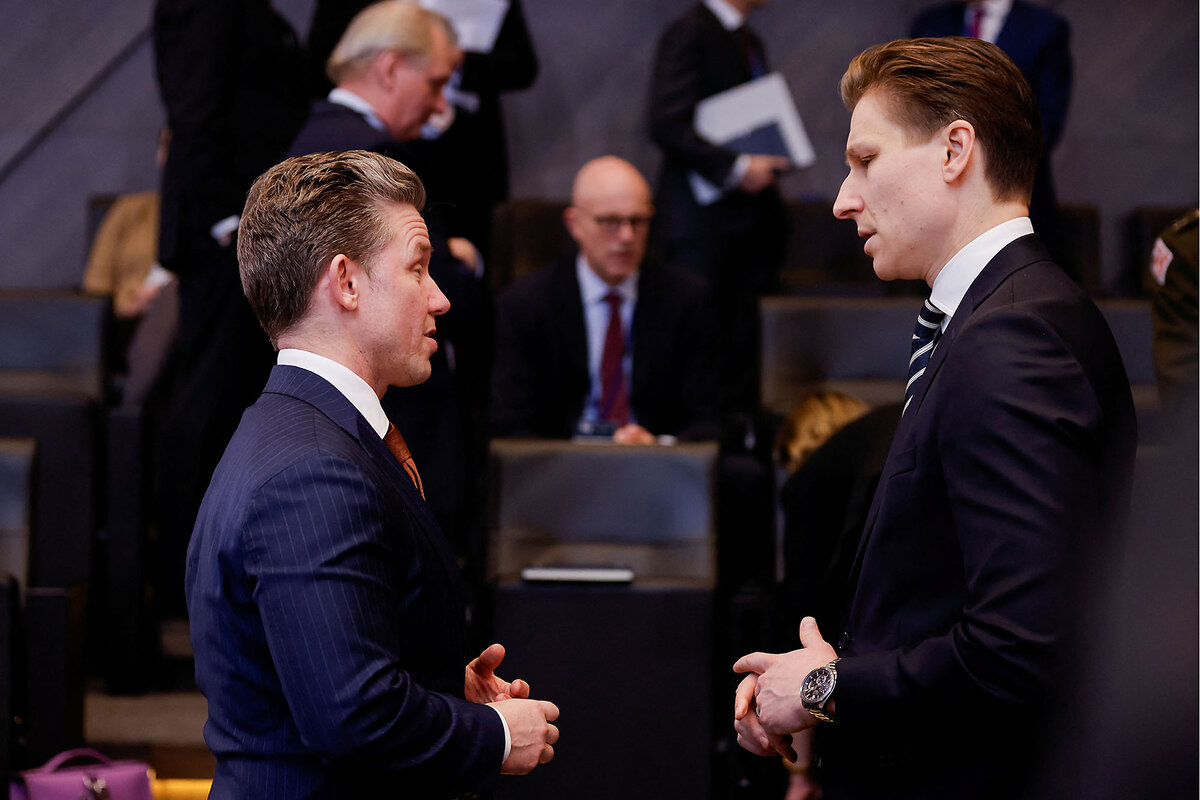Europe casts wary eye as Americans debate engagement with world
Loading...
When Donald Trump recently suggested he would encourage Russia to attack financially “delinquent” U.S. allies in Europe if he returned to the White House, President Joe Biden reacted strongly. “It’s un-American!” he fumed.
But is it really?
That’s the question haunting Washington’s European partners who are joining U.S. representatives at a trio of security meetings in Brussels and Munich this week.
Why We Wrote This
The United States has wrangled historically over playing a large role on the global stage or turning inward. As the pull of “America First” intensifies, the current battle could have significant security consequences for Ukraine and the rest of Europe.
The reason: They’re aware that the U.S. creation and leadership of NATO since World War II represents just one distinctly American vision of engagement with the world. During other stretches of its history, America has turned inward, resisting involvement in meeting challenges or addressing crises overseas.
With echoes of the “America first” mantra of Mr. Trump, it has retreated into what the late Henry Kissinger once called “sulking isolationism.”
The prospect of that happening again is worrying European allies for two reasons.
The first is that Europeans recall almost viscerally America’s most dramatic recent retreat into isolationism. It began in the years after World War I, leading Washington largely to stand aside as Adolf Hitler’s Germany rearmed, then threatened, and finally invaded its neighbors.
The second is Russian President Vladimir Putin’s invasion of Ukraine, provoking the largest armed conflict in Europe since the end of World War II.
Mr. Biden’s response to Mr. Trump’s remarks, in which he reaffirmed America’s “sacred commitment” to the trans-Atlantic defense alliance, will have reassured Europeans attending the security discussions with U.S. counterparts this week.
But their concerns inevitably colored the first two of those meetings on Wednesday.
When NATO’s defense ministers convened in Brussels, its secretary-general, Jens Stoltenberg, was at pains to tell reporters the alliance would “continue to ensure that there is no room for miscalculation in Moscow about our readiness and resolve to protect all allies.”
A second Brussels meeting involved the Ukraine Defense Contact Group, the partnership of more than 50 nations that the United States assembled after Mr. Putin’s invasion to help arm Kyiv. U.S. Secretary of Defense Lloyd Austin, clearly aware of allies’ doubts and concerns, avoided mention of opposition back home to Washington’s latest funding package. He insisted the U.S. remained committed to supporting Kyiv, because that was both right and a matter of “core national security” interest.
On Friday, the annual Munich Security Conference will get underway, bringing together political and defense figures from Europe, the U.S., and beyond.
When these gatherings took place a year ago, there was a palpable sense of confidence and common purpose: to help Ukraine defeat the invasion and, it was hoped, ultimately push Mr. Putin’s forces back into Russia. At last year’s Munich conference, China’s foreign minister met a stern rebuff when he urged Europeans to distance themselves from what he portrayed as an American agenda to arm Ukraine and prolong the war.
The sense of shared U.S.-European commitment does survive. But after the failure of Ukraine’s offensive to drive Mr. Putin’s troops significantly backward, a rearming Russia could soon be in a position to make advances of its own.
Ukraine is still waiting for promised tanks, air defense batteries, and fighter planes. It’s running short of artillery shells.
And with Mr. Trump urging supporters to vote no, a U.S. funding package for Ukraine has been languishing in Congress for months. This week, with some Republicans defying the former president, the Senate approved it. But it still needs to get through the Republican-controlled House of Representatives.
The irony, given Mr. Trump’s portrayal of NATO’s European members as freeloaders, is that the Europeans are now playing an increasingly critical role.
Even before the invasion, member states were taking strides to meet a 2006 target of spending a minimum of 2% of their gross domestic product on defense – in part, no doubt, because of then-President Trump’s implicit threat to pull back from the U.S. commitment to NATO.
Yet the greater increase in defense spending has been more recent. Its catalyst: President Putin.
His war in Ukraine has made defense a vital priority for European states, especially those like Estonia, Lithuania, Latvia, and Poland that escaped Moscow’s orbit with the collapse of the Soviet Union.
Sweden and Finland – Russian neighbors that long relied on neutrality as a strategy for coexistence with Moscow – have reacted to the invasion by choosing to join NATO.
Europe as a whole seems convinced that if Mr. Putin does prevail militarily in Ukraine, it’s only a matter of time before he would threaten – and possibly use – force against other states.
Early this month, the 27-nation European Union approved its own $54 billion support package for Ukraine. While the EU is an economic bloc, the war has led it to venture into defense issues – especially in efforts to ramp up the manufacture of arms and ammunition.
The likely short-term effect of Mr. Trump’s NATO remarks will be to reinforce calls within Europe to accelerate such efforts, and more generally to equip Europe to constrain Russia even if the Americans conclude that their own national interests don’t require Ukraine to prevail.
Still, the concern over a major retreat from U.S. involvement in Europe – on the order of what happened after World War I – goes beyond the difficulty European countries will have in assembling a credible defense against Mr. Putin on their own.
It’s the loss of NATO’s main function since its founding 75 years ago: to act as a deterrent by signaling that an attack on any member state would be an attack on all, including the U.S.
President Biden reiterated that core provision this week. “If Putin attacks,” he said, “the United States will defend every inch of NATO territory.”
But he also included a qualifier that will have been less comforting:
“For as long as I’m president ...”







